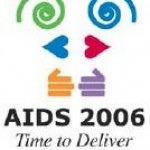This afternoon, on the second day of the International AIDS Conference here in Toronto, I debated hearing a discussion on “Viral Evolution or Diversity.” Deciding that was likely to be dry, overly scientific and way over my head, however, I instead chose “Ethical Issues on Clinical Trials: Tenofovir and Beyond.”
The title flooded my head with images of the 2004 conference in Bangkok, when activists from ACT-UP Paris stormed the Gilead booth in the conference exhibition hall. Physically destroying it in a frenzied hail of whistles, lights and television cameras, they then surrounded what remained with a banner two stories tall that read: CLOSED–DUE TO DEATH.
The controversy was over pre-exposure prophylaxis (PREP) trials in the developing world that had been called into question by a number of the host countries and halted in two or three countries. The concern was that participants who become infected during the trial would have no access to HIV meds. They would, however, have access to HIV education and information on how to protect themselves from HIV infection.
More images came to mind of politicians at various conference events taking the opportunity to grandstand on this issue. One high-ranking politician from Cambodia (one country where the trials had been halted) proclaimed something like, “If they need to test HIV drugs, let them do it on animals. Not on Cambodians.” (It’s worth noting that Gilead was not an actual sponsor of any of the PREP trials.)
This afternoon, the issue was discussed with as much heat as ever for more than two hours. Among the questions: What are the moral obligations of the trial sponsors to provide care to those involved in the trial who become HIV positive during its course? How could the developing-world host countries be empowered so as to be an equal partner in the trial design negotiations? How could the meds, which may not be needed until many years after the completion of the trial, be provided to those infected during the trial? How would these issues (and costs) affect the progress of microbicide trials, which are already underfunded and struggling to get established?
I sat transfixed by the issues and stories placed before me, watching so many sincere people try to resolve inequities that are complex and deeply rooted. While I sympathized (as anyone would) with the plight of those infected during this research and the seemingly insurmountable hurdles to their getting care, I was struck by how unspoken were the benefits of the countless others who would be spared infection if any of these approaches (microbicides or drug therapy) proved effective.
The rhetoric was unbelievable. One Cambodian woman said she her friends would dance in the street if tenofovir failed to block HIV transmission in these studies. Alhough I understood the insult of how beyond reach tenofovir may remain if it proved effective, I felt there would be little cause to celebrate. I wondered if it was understood how these comments and the heat of this rhetoric would also hold back microbicide research. Microbicides, unlike tenofovir, will likely be both financially feasible in the developing world and give women a unilateral option to protect themselves from HIV infection.
But this is why I go to international conferences, to be rudely shaken from the problems of my life and my world and to hear the circumstances of how so many live in the shadow of this disease.
Tomorrow, I look forward to a plenary talk by Julio Montaner, president elect of the International AIDS Society—I smell controversy there. His is a topic close to my heart: a discussion of the developing world epidemic in the developed world. Particularly a session that looks at the “state of AIDS in black America.”
Lloyd Bailey, MD, practices at the Spellman Center at St. Vincent’s Midtown Hospital in New York City. Also check out his IAC dispatches from August 16 and 18.
Advertisement
Advertisement
Advertisement





Comments
Comments